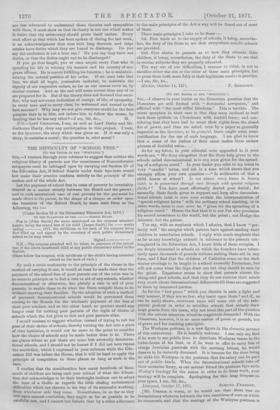THE DIFFICULTY OF " SCHOOL FEES."
[To THE EDITOR OP THE "SPECTATOR,"] SIR,-1 venture through your columns to suggest that neither the religious liberty of parents nor the consciences of Nonconformist ratepayers need be infringed upon by carrying out Section 25 of the Education Act, if School Boards under their bye-laws would but make their practice conform strictly to the principle of the section and of the whole Act.
Let the payment of school fees in cases of poverty be invariably treated as a matter strictly between the Board and the parent ; and in each ascertained case of real poverty let the payment be made direct to the parent, in the shape of a cheque or order upon the treasurer of the School Board, in some such form as the following, viz.
(Under Section 25 of the Elementary Education Act, 1870.) To THE TREASURER OF THE --sonoor. BOARD. Pay to Vohn Smith] tho sums mentioned on the coupons attached hereto, being the school fees of his child [James Smith] for — weeks
ending , 1871, the certificate on the back of the coupons being first filled up and signed by the secretary of such public elementary school as be may select. Signed.
N.B.—The coupons attached will be taken in payment of the school fees of the above-montioned child at any public elementary school in the district.
(Here follow the coupons, with certificate of the child's having attended school on the back of each.)
By such a strict conformity to the principle of the clause in the method of carrying it out, it would at least be made clear that the payment of the school fees of poor parents out of the rates was in no sense in principle or in fact a rate in aid of any schools, whether denominational or otherwise, but plainly a rate in aid of poor parents, to enable them to do what the State compels them to do without starving their families. By the adoption of such a method of payment denominational schools would be prevented from coining to the Boards for the wholesale payment of the fees of their poor scholars, and on the other hand, no pretext would any longer exist for robbing poor parents of the right of choice of schools which the Act gives to rich and poor parents alike.
I would venture to suggest whether, instead of trying to rob the poor of their choice of schools, thereby turning the Act into a piece of class legislation, it would not be more to the point to consider how the choice of schools may be made better than it is. There are places where as yet there are none but avowedly denomina- tional schools, and I should not be honest if I did not here repeat the conviction, which I expressed in your columns while the Edu- cation Bill was before the House, that it will be hard to apply the principle of compulsion in these places so long as such is the case.
I confess that the consideration how many hundreds of thou- sands of children are being each year robbed of what the Educa- tion Act acknowledges to be their birthright inclines one to adopt the tone of a Gallio as regards the little chafing ecclesiastical difficulties which are thrown in the way of its successful working, from whichever side they come. Nevertheless, in so far as they rest upon earnest conviction, they ought as far as possible to be carefully met, and I cannot but believe that by a strict adherence to the main principles of the Act a way will be found out of most of them.
Those main principles I take to be these :—
1st. Free trade as to the supply of schools, it being, neverthe- less, the duty of the State to see that everywhere suitable schools are provided.
2nd. Free choice to parents as to how they educate their children, it being, nevertheless, the duty of the State to see that in secular subjects they are properly educated.
The way out of our difficulties, I venture to think, is not to sacrifice either the one or the other of these main principles, but to press them both more fully to their legitimate results in practice. —I am, Sir, &c.,


































 Previous page
Previous page